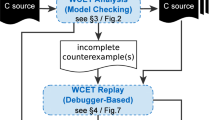Abstract
The USES group follows an approach to compute reliable runtime guarantees which is based on well-understood theoretical foundations, practical in use, and efficient.
Our worst case execution time (WCET) prediction tool is modularly structured: the task of determining the WCET is divided into a sequence of subtasks. The structure has been developed by taking into account the results of previous work. The subtasks value analysis, cache analysis, and pipeline analysis are tackled by abstract interpretation. Path analysis is performed by integer linear programming (ILP).
The analyses will be embedded in a framework which allows to generate (or adapt) the analyses from one target description and provides well defined interfaces and, exchange formats.
Access this chapter
Tax calculation will be finalised at checkout
Purchases are for personal use only
Preview
Unable to display preview. Download preview PDF.
Similar content being viewed by others
References
A.V. Aho, R. Sethi, and J.D. Ullman. Compilers: Principles, Techniques, and Tools. Addison Wesley, 1986.
F. Bodin, Z. Chamski, E. Rohou, and A. Seznec. Functional Specification of SALTO: A Retargetable System for Assembly Language Transformation and Optimization. rev. 1.00 beta. INRIA, June 1997.
P. Cousot and R. Cousot. Abstract Interpretation: A Unified Lattice Model for Static Analysis of Programs by Construction or Approximation of Fixpoints. In POPL, pages 238 - 252, January 1977.
C. Ferdinand. Cache Behavior Prediction for Real-Time Systems. PhD Thesis, Uni. d. Saarlandes, September 1997.
C. Ferdinand, F. Martin, and R. Wilhelm. Applying Compiler Techniques to Cache Behavior Prediction. In LCTRTS, pages 37 - 46, June 1997.
C. Ferdinand, F. Martin, R. Wilhelm, and M. Alt. Cache Behavior Prediction by Abstract Interpretation. Science of Computer Programming, Elsevier, 1998.
A. Fauth, J. Van Praet, and M. Freericks. Describing Instruction Set Processors Using nML. In European Design and Test Conference. IEEE, 1995.
C. Ferdinand and R. Wilhelm. On Predicting Data Cache Behavior for Real-Time Systems. In Proceedings of the ACM SIGPLAN Workshop on Languages, Compilers and Tools for Embedded Systems, June 1998.
George Hadjiyiannis. ISDL: Instruction Set Description Language Version 1.0. Technical report, MIT RLE, April 1998.
D. Kästner and S. Thesing. Cache Sensitive Pre-Runtime Scheduling. In Proceedings of the ACM SIGPLAN Workshop on Languages, Compilers and Tools for Embedded Systems, Montreal, Canada, June 1998.
S.-S. Lim, Y. H. Bae, G. T. Jang, B.-D. Rhee, S. L. Min, C. Y. Park, H. Shin, K. Park, S.-M. Moon, and C. S. Kim. An Accurate Worst Case Timing Analysis for RISC Processors. IEEE Transactions on Software Engineering, 21 (7): 593 - 604, July 1995.
Y.-T. S. Li, S. Malik, and A. Wolfe. Cache Modeling for Real-Time Software: Beyond Direct Mapped Instruction Caches. In RTSS, December 1996.
F. Martin. PAG—an efficient program analyzer generator. International Journal on Software Tools for Technology Transfer, 2 (1), 1998.
F. Martin. Generation of Program Analyzers PhD thesis, Uni. d. Saarlandes, 1999. to appear.
F. Martin, M. Alt, R. Wilhelm, and C. Ferdinand. Analysis of Loops. In Proceedings of the International Conference on Compiler Construction (CC98). Springer, 1998.
F. Mueller. Generalizing Timing Predictions to Set-Associative Caches. TR96-66, Institut f. Informatik, Humboldt-University, July 1996.
F. Mueller, D. B. Whalley, and M. Harmon. Predicting Instruction Cache Behavior. In LCTRTS, 1994.
F. Nielson, H. R. Nielson, and C. Hankin. Principles of Program Analysis. Springer, 1999.
P. Puschner and Ch. Koza. Calculating the Maximum Execution Time of Real-Time Programs. Real-Time Systems, 1: 159 - 176, 1989.
C. Y. Park and A. C. Shaw. Experiments with a Program Timing Tool Based on Source-Level Timing Schema. IEEE Computer, 24(5):48-57, May 1991. [Sch98] Jörn Schneider. Statische Pipeline-Analyse für Echtzeitsysteme. Dipl. Thesis, Universität des Saarlandes, October 1998.
J. Schneider and C. Ferdinand. Pipeline behavior prediction for superscalar processors. Technical Report A/02/99, Uni. d. Saarlandes, February 1999.
Martin Sicks. Adreßbestimmung zur Vorhersage des Verhaltens von Daten-Caches. Dipl. Thesis, Uni. d. Saarlandes, 1997.
H. Theiling and C. Ferdinand. Combining Abstract Interpretation and ILP for Microarchitecture Modelling and Program Path Analysis. In RTSS, pages 144 - 153, Madrid, Spain, December 1998.
H. Theiling. Über die Verwendung ganzzahliger linearer Programmierung zur Suche nach längsten Programmpfaden. Dipl. Thesis, Uni. d. Saarlandes, Sep. 1998.
R. Wilhelm and D. Maurer. Compiler Design. International Computer Science Series. Addison-Wesley, 1995. Second Printing.
Author information
Authors and Affiliations
Editor information
Editors and Affiliations
Rights and permissions
Copyright information
© 1999 Springer-Verlag Berlin Heidelberg
About this paper
Cite this paper
Ferdinand, C. et al. (1999). Run-Time Guarantees for Real-Time Systems—The USES Approach. In: Beiersdörfer, K., Engels, G., Schäfer, W. (eds) Informatik’99. Informatik aktuell. Springer, Berlin, Heidelberg. https://doi.org/10.1007/978-3-662-01069-3_60
Download citation
DOI: https://doi.org/10.1007/978-3-662-01069-3_60
Publisher Name: Springer, Berlin, Heidelberg
Print ISBN: 978-3-540-66450-5
Online ISBN: 978-3-662-01069-3
eBook Packages: Springer Book Archive




